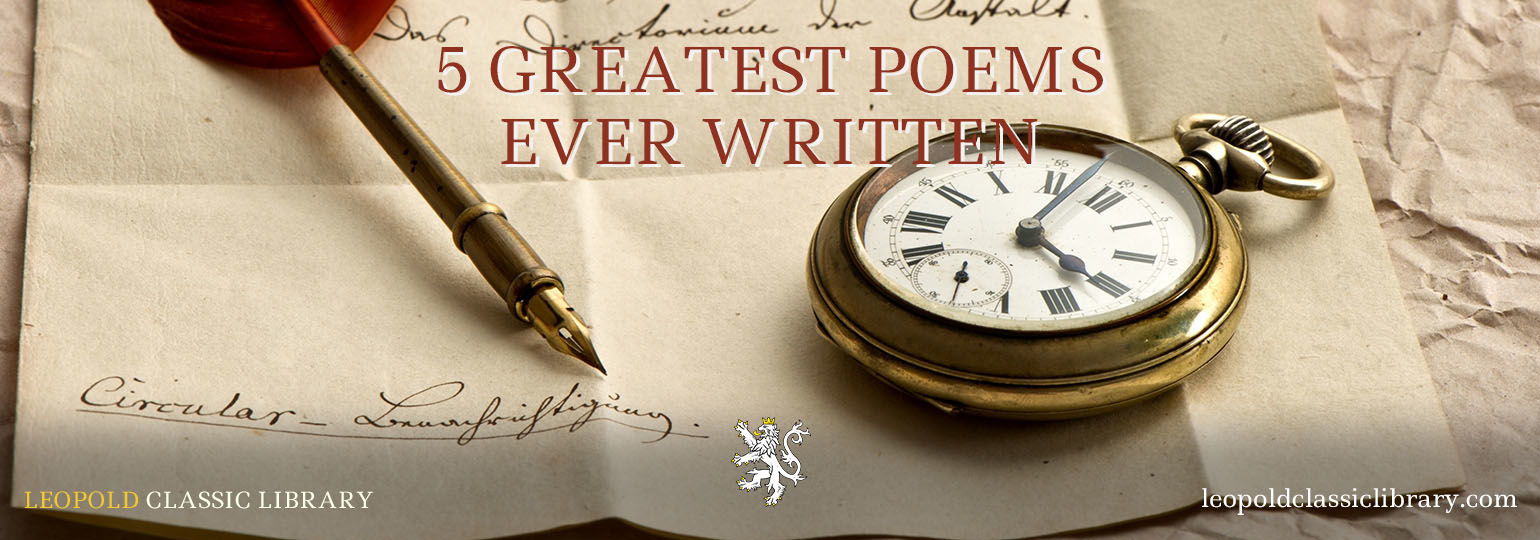5 Greatest Poems Ever Written

Poetry has great power. It awakens the beauty of the human mind, it inspires, it heals the soul, it helps people understand themselves and the world around them. Innumerable gorgeous poems have touched people's hearts and minds with the perfection of their style, the fullness of their rhythm and rhyme, and their unique insights into the human condition. Choosing the best poems ever written will always depend on personal taste and preferences. Leopold Classic Library is delighted to bring to your attention its own Top 5 greatest poems of all time:
The New Colossus by Emma Lazarus
"The New Colossus" is a sonnet that was written by American poet Emma Lazarus in 1883 to raise money for the construction of the pedestal of the Statue of Liberty. In 1903, the poem was engraved on a bronze plaque and mounted inside the pedestal's lower level. The title of the poem and the first two lines refer to the Colossus of Rhodes, which was one of the Seven Wonders of the Ancient World.
Not like the brazen giant of Greek fame,
With conquering limbs astride from land to land;
Here at our sea-washed, sunset gates shall stand
A mighty woman with a torch, whose flame
Is the imprisoned lightning, and her name
Mother of Exiles. From her beacon-hand
Glows world-wide welcome; her mild eyes command
The air-bridged harbor that twin cities frame.
“Keep, ancient lands, your storied pomp!" cries she
With silent lips. “Give me your tired, your poor,
Your huddled masses yearning to breathe free,
The wretched refuse of your teeming shore.
Send these, the homeless, tempest-tossed to me,
I lift my lamp beside the golden door!"
We'll Go No More A-Roving by Lord Byron
"So, we'll go no more a roving" is a poem, written by George Gordon Byron, which was included in a letter to Thomas Moore on 28 February 1817. Later Moore published the poem as part of Letters and Journals of Lord Byron. The poem describes the fatigue of age conquering the restlessness of youth.
So, we'll go no more a-roving
So late into the night,
Though the heart be still as loving,
And the moon be still as bright.
For the sword outwears its sheath,
And the soul wears out the breast,
And the heart must pause to breathe,
And love itself have rest.
Though the night was made for loving,
And the day returns too soon,
Yet we'll go no more a-roving
By the light of the moon.
http://leopoldclassiclibrary.
A Poison Tree by William Blake
"A Poison Tree" is a poem written by William Blake, included to his illustrated collection Songs of Experience (1794). It describes the narrator's repressed feelings of anger towards an individual, emotions which eventually lead to murder. The poem explores themes of indignation, revenge, and more generally the fallen state of mankind.
I was angry with my friend;
I told my wrath, my wrath did end.
I was angry with my foe:
I told it not, my wrath did grow.
And I watered it in fears,
Night & morning with my tears:
And I sunned it with smiles,
And with soft deceitful wiles.
And it grew both day and night,
Till it bore an apple bright.
And my foe beheld it shine,
And he knew that it was mine.
And into my garden stole.
When the night had veiled the pole;
In the morning glad I see,
My foe outstretched beneath the tree.
http://leopoldclassiclibrary.
Sonnet 116 by William Shakespeare
Sonnet 116 is one of Shakespeare's most famous love sonnets. It is about love in its most ideal form. It posits that love cannot be true if it changes for any reason, that true love should be constant, through any difficulties. Sonnet 116 was first published in 1609. Its structure and form are a typical example of the Shakespearean sonnet.
Let me not to the marriage of true minds
Admit impediments. Love is not love
Which alters when it alteration finds,
Or bends with the remover to remove.
O no! it is an ever-fixed mark
That looks on tempests and is never shaken;
It is the star to every wand'ring bark,
Whose worth's unknown, although his height be taken.
Love's not Time's fool, though rosy lips and cheeks
Within his bending sickle's compass come;
Love alters not with his brief hours and weeks,
But bears it out even to the edge of doom.
If this be error and upon me prov'd,
I never writ, nor no man ever lov'd.
http://leopoldclassiclibrary.
When I Consider How My Light is Spent by John Milton
This is one of the best known of the sonnets of John Milton, which was first published in Milton's 1673 Poems. It is often given the title On His Blindness, but there is no evidence Milton use such a title, which was assigned a century later by Thomas Newton in his 1761 edition of Milton's poetry.
When I consider how my light is spent
Ere half my days in this dark world and wide,
And that one talent which is death to hide
Lodg'd with me useless, though my soul more bent
To serve therewith my Maker, and present
My true account, lest he returning chide;
"Doth God exact day-labour, light denied?"
I fondly ask. But Patience to prevent
That murmur, soon replies: "God doth not need
Either man's work or his own gifts; who best
Bear his mild yoke, they serve him best. His state
Is kingly. Thousands at his bidding speed
And post o'er land and ocean without rest:
They also serve who only stand and wait."
http://leopoldclassiclibrary.
